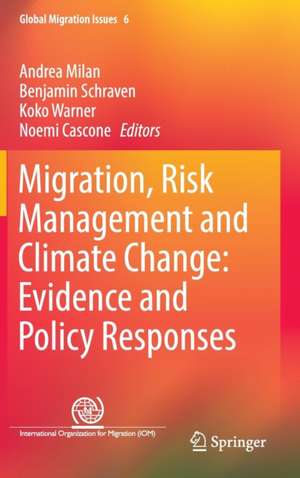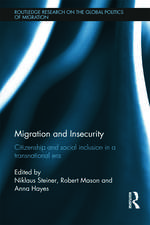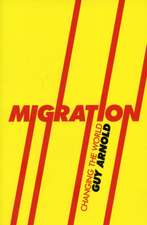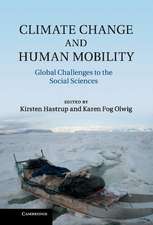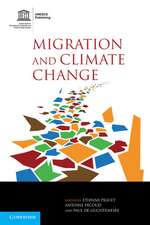Migration, Risk Management and Climate Change: Evidence and Policy Responses: Global Migration Issues, cartea 6
Editat de Andrea Milan, Benjamin Schraven, Koko Warner, Noemi Casconeen Limba Engleză Hardback – 21 noi 2016
| Toate formatele și edițiile | Preț | Express |
|---|---|---|
| Paperback (1) | 637.78 lei 6-8 săpt. | |
| Springer International Publishing – 24 iun 2018 | 637.78 lei 6-8 săpt. | |
| Hardback (1) | 643.99 lei 6-8 săpt. | |
| Springer International Publishing – 21 noi 2016 | 643.99 lei 6-8 săpt. |
Preț: 643.99 lei
Preț vechi: 757.63 lei
-15% Nou
Puncte Express: 966
Preț estimativ în valută:
123.23€ • 128.99$ • 102.56£
123.23€ • 128.99$ • 102.56£
Carte tipărită la comandă
Livrare economică 31 martie-14 aprilie
Preluare comenzi: 021 569.72.76
Specificații
ISBN-13: 9783319429205
ISBN-10: 3319429205
Pagini: 251
Ilustrații: XIII, 229 p. 11 illus.
Dimensiuni: 155 x 235 x 14 mm
Greutate: 0.52 kg
Ediția:1st ed. 2016
Editura: Springer International Publishing
Colecția Springer
Seria Global Migration Issues
Locul publicării:Cham, Switzerland
ISBN-10: 3319429205
Pagini: 251
Ilustrații: XIII, 229 p. 11 illus.
Dimensiuni: 155 x 235 x 14 mm
Greutate: 0.52 kg
Ediția:1st ed. 2016
Editura: Springer International Publishing
Colecția Springer
Seria Global Migration Issues
Locul publicării:Cham, Switzerland
Cuprins
Introduction – “Climate change and human mobility after Paris“ by Koko Warner.- PART 1 – Mountain areas: Chapter 1 – “An index based assessment of vulnerability to floods in the Upper Indus Sub-Basin: What role for remittances?” by Soumyadeep Banerjee, Muhammad Zubair Anwar, Giovanna Gioli, Suman Bisht, Saleem Abid, Nusrat Habib, Sanjay Sharma, Sabarnee Tuladhar, Azeem Khan.- Chapter 2 – “Role of remittances in building farm assets in the flood affected households in Koshi sub-basin in Nepal” by Soumyadeep Banerjee, Suman Bisht, Bandita Sijapati, Meena Poudel, Dominic Kniveton.- Chapter 3 – “Migration as a Risk Management Strategy in the Context of Climate Change – Evidence from the Bolivian Andes” by Regine Brandt, Raoul Kaenzig and Susanne Lachmuth.- Chapter 4 –“Circular migration and local adaptation in the mountainous community of Las Palomas (Mexico)?” by Noemi Cascone, Ana Elisa Peña del Valle Isla and Andrea Milan.- PART 2 – Low-lying areas: Chapter 5 – “Household adaptation strategies to climate extremes impacts and population dynamics: case study from the Czech Republic” by Robert Stojanov, Barbora Duží, Ilan Kelman, Daniel Němec and David Procházka.- Chapter 6 – “Moving beyond the focus on environmental migration towards recognizing the normality of translocal lives – Insights from Bangladesh” by Benjamin Etzold and Bishawjit Mallick.- PART 3 – Small Islands: Chapter 7 – “Good fishing in Rising Seas: Kandholhudhoo, Dhuvafaaru, and the need for a Development-based Migration Policy in the Maldives” by Andrea Simonelli Chapter 8 – “The reason land matters: relocation as adaptation to climate change in Fiji Islands” by Dalila Gharbaoui and Julia Blocher.- Chapter 9 – “The Role of Remittances in Risk Management and Resilience in Tuvalu: Evidence and potential policy responses” by Sophia Kagan.- PART 4 – Policy: Chapter 10 –“ Remittances for adaptation: an ‘alternative source’ of international climate finance?” by Barbara Bendandi and Pieter Pauw.- Chapter11– Conclusion– “Migration as adaptation: conceptual origins, recent developments, and future directions?” by Robert McLeman.
Textul de pe ultima copertă
This edited volume explores the circumstances under which vulnerable communities can better adapt to climate and environmental change, and focuses in particular on the centrality of migration as a resilience and adaptation strategy for communities at risk. The book features important case studies where migration is being used as a risk management strategy in the Pacific, Sub-Sahara Africa, Latin America, and Europe. Its comparative analysis reveals common patterns in enhancing local resilience through migration across diverse regional, socio-economic, cultural, and political contexts. This book is a contribution to the global discussion about the future of migration policy, especially as climate and environmental change is expected to grow as one of the most pressing challenges of our time.
Caracteristici
Explores the circumstances under which migration can actually increase the resilience of households in the face of climate and environmental change Features several case studies that explore migration and adaptation in the Pacific, Sub-Sahara Africa, Latin America, and Europe Coverage includes empirical evidence and potential policy responses Includes supplementary material: sn.pub/extras
